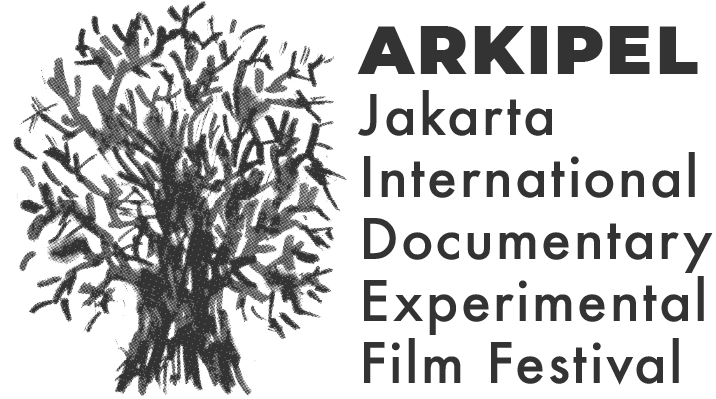Catatan Tentang Forum Festival Panel I
Ludic dan Performativitas
Forum Festival Panel 1 yang bertemakan Ludic dan Performativitas ini merupakan salah satu bagian dari rangkaian simposium Forum Festival pada ARKIPEL homoludens: 6th Jakarta International Documentary & Experimental Film Festival yang dilaksanakan pada hari Rabu pagi tanggal 8 Agustus 2018, pukul 09.00 – 10.30 WIB di GoetheHaus, Goethe-Institut Indonesien dan dihadiri oleh 37 peserta dari berbagai komunitas maupun tamu festival.
Acara ini diawali pidato tentang tujuan dilaksanakannya Forum Festival oleh Prashasti Wilujeng Putri selaku koordinator Forum Festival. Menurut pidato tersebut, salah satu tujuan pelaksanaan acara ini adalah sebagai ruang dialog yang memperkuat infrastruktur pengetahuan sinema. Selain itu Prashasti juga mengumumkan bahwa buku yang berisi esai dan transkrip diskusi Forum Festival pada ARKIPEL Penal Colony yang dilaksanakan tahun lalu telah resmi dirilis pada tahun ini.

Kiri ke kanan: Afrizal Malna, Prashasti Wilujeng Putri, Azar Mahmoudian
Setelah dibuka oleh Prashasti, acara dilanjutkan dengan pidato pembuka oleh Akbar Yumni — pegiat teater, penulis kritik filem di Jurnal Footage serta salah satu selektor dan kurator ARKIPEL. Pada sesi ini, Akbar Yumni mengangkat tema “Ludic dan Kebertubuhan di Era Digital”. Ia sempat mengulas tentang istilah Homo ludens, yang dituliskan oleh Johan Huizinga pada tahun 1938, ke dalam spasialitas hari ini. Dalam presentasinya, ia membedakan antara Homo ludens dan Homo faber. Ia mengatakan bahwa menurut Hannah Arendt, Homo faber adalah pembangun dinding (baik fisik dan kultural) yang membagi dunia manusia dan alam, serta menyediakan sebuah konteks yang stabil (dunia bersama) dari ruang dan institusi di mana kehidupan manusia dapat terungkap. Sedangkan Homo ludens adalah mahluk yang selalu berorientasi terhadap proses di mana sebuah permainan tidak mengandaikan sebuah akhir dan hasil maupun sifat kompetitif.
Di pertengahan pidatonya, Akbar Yumni juga memutar sebuah dokumentasi performans yang berjudul Out of in The Penal Colony yang membicarakan tentang hubungan dunia nyata dan proyeksinya pada dunia digital yang dihadirkan secara langsung dalam pertunjukan. Selain itu, ia juga beberapa kali mengutip sudut pandang filsafat tentang teknologi. Salah satunya ialah pandangan dari Don Ihde tentang hubungan manusia dan teknologi yang bersifat hermeneutis di mana manusia membaca dunia melalui instrumen – teknologi dalam hal ini. Pada akhir pembukaannya, Akbar memberi sepintas kesimpulan bahwa Homo ludens menjadi penting bukan karena bagus atau buruknya sebuah sinema sebab anggapan demikian berangkat dari postulat yang mengandaikan hasil akhir. Homo ludens justru lahir pada sinema yang mengandaikan pula sebuah ‘amatirisme’ dan kepublikan selagi membayangkan sinema di era digital yang terbuka bagi semua masyarakat.



Setelah pidato pembuka dari Akbar Yumni, acara dilanjutkan dengan topik utama Panel 1 yaitu Ludic dan Performativitas. Pada Panel 1 ini, terdapat 2 pembicara yaitu Afrizal Malna – yang merupakan seorang penyair sekaligus Ketua Komite Teater Dewan Kesenian Jakarta – dan Azar Mahmoudian – kurator dan pendidik yang berbasis di Tehran. Panel ini kemudian dimoderatori oleh Prashasti Wilujeng Putri.
Pada sesi ini, Azar Mahmoudian diberikan kesempatan pertama untuk memaparkan presentasinya. Ia memulai presentasi tersebut dengan beberapa poin sebagai landasan awal panel, di antaranya poin tentang elemen bermain dalam kebudayaan atau elemen bermain dalam ranah artistik dan praktik sosial yang lebih luas beserta sejarah dan historiografinya, lingkungan yang dapat mengondisikan kemungkinan-kemungkinan bagi Homo ludens dan kemajuan teknologi beserta ruang virtual dan pengalaman sinematik sebagai sumber pembangkit energi bagi Homo ludens yang juga dihasilkan oleh Homo ludens itu sendiri. Selain menjabarkan poin-poin tersebut, Azar dalam presentasinya juga memaparkan kritiknya tentang teknologi yang mereduksi kolektivitas dan tentang mitos ruang virtual yang membawa kolektivitas baru. Namun ia juga menjelaskan bahwa ia sendiri tidak skeptis terhadap kehadiran teknologi dan tetap membuka dirinya untuk berdialektika dengan hal tersebut.



Pembicara kedua pada sesi ini adalah Afrizal Malna yang membawakan bahasan tentang bahasa dalam gesekan-gesekan media baru. Pada awal pembicaraannya, Afrizal Malna sedikit menanggapi bahasan Azar Mahmoudian. Ia mengatakan bahwa bermain-main dapat melumerkan otoritas, yang mana dalam hal ini berupa sebuah sistem yang tetap “mendikte” atau dibentuk di balik kemasyhuran “demokrasi” di ruang virtual (baca: internet).
Setelah mengomentari pendapat Azar, lalu Afrizal melanjutkan diskusi dengan bentuk performatif di mana ia membawa mangkuk bening yang kemudian diisi air dan meletakkan beberapa lembar kertas di atas meja. Melalui performans ini, Afrizal berusaha menyampaikan pikiran-pikirannya mengenai bahasa dan perkembangan teknologi dengan menganalogikan tubuh sebagai lembaran kertas yang secara bertahap mengalami perubahan tanpa bisa kembali seperti semula seiring dengan jejak teknologi yang melekat padanya.
Setelah kedua pembicara selesai, moderator melanjutkannya dengan sesi Tanya jawab di mana terdapat dua orang peserta yang bertanya. Penanya pertama adalah Alfi yang merupakan pembuat filem dan penanya kedua ialah Anggraeni yang merupakan salah satu anggota Forum Lenteng. Selain menanggapi presentasi Azar tentang pengalaman menonton dan era digital, penanya juga menanggapi paparan Afrizal namun lebih menyinggung tentang segmentasi antara puisi dan disiplin seni lainnya.
Kedua pembicara lalu dipersilahkan untuk menanggapi. Pada kesempatan ini, Azar menjawab sekaligus melengkapi pendapatnya bahwa tujuannya bukanlah untuk membentuk sistem biner antara ruang virtual dan ruang nyata. Ia juga memberikan pernyataan kembali bahwa memang di era internet ini kita semakin memiliki banyak pilihan, tapi pilihan-pilihan tersebut juga telah dibentuk. Afrizal dalam jawabannya untuk pertanyaan pertama mengungkapkan bahwa sebetulnya yang terjadi bukanlah sebuah segmentasi, namun memang terdapat beberapa hal yang “tereduksi” ketika puisi diterjemahkan ke media lain.***
Catatan Tentang Forum Festival Panel I
Ludic and Performativity
Forum Festival’s first panel, titled “Ludic and Performativity”, is a part of Forum Festival symposium in ARKIPEL homoludens: 6th Jakarta International Documentary & Experimental Film Festival. The panel was held on Wednesday morning, August 8, 2018, from 09.00 to 10.30, at the GoetheHaus, Goethe-Institut Indonesien, and was attended by 37 participants ranging from communities to festival guests.
The event was started by a speech about the purpose of Forum Festival delivered by Prashasti Wilujeng Putri as Forum Festival coordinator. According to the speech, one of the event’s missions is to be a discursive space to strengthen the infrastructure of our knowledge about cinema. Prashasti also announced that the collection of essays and transcripts from last year’s Forum Festival in ARKIPEL Penal Colony is ready to publish as a book.



Left to right: Afrizal Malna, Prashasti Wilujeng Putri, Azar Mahmoudian
After Prashasti’s speech, the event proceeded with an introductory speech from Akbar Yumni — a theatre activist and film critic on Jurnal Footage, also one of the selectors and curators of ARKIPEL. In this session, Akbar Yumni talked about “Ludic and Embodiedness in the Digital Era.” He introduced the term Homo ludens, first written by Johan Huizinga on 1938, into today’s spatiality. In his presentation, he differentiated Homo ludens from Homo faber. According to Hannah Arendt, Homo faber is a wall-builder (both physically and culturally), separating human’s world and the nature, which also provides a stable context (a collective world) for a space and institution which can reveal the true human life. Meanwhile, Homo ludens is a creature who always aims for a game that rules aside the end, the result, or competitiveness.
In the middle of his speech, Akbar Yumni also screened documentation of performance titled Out of in The Penal Colony, which represents the relationship between the real world and its digital projections. He also quoted philosophical viewpoints on technology a couple of times. One of them is Don Ihde’s notion on the hermeneutic relation between human and the technology, where humans see the world through instruments — in this case, is technology. At the end of his keynote speech, Akbar concluded the importance of Homo ludens is not related to the good/bad dichotomy of cinema, because those notions departed from the output-oriented postulate. The birth of Homo ludens came from a cinematic tradition that presupposes amateurism and the sense of public, while it imagines a public-friendly cinema in the digital era.



After the keynote speech from Akbar Yumni, the session continued to the Panel 1, Ludic and Performativity. This panel has two speakers: Afrizal Malna — a poet, who is also the head of Jakarta Arts Council Theatre Committee — and Azar Mahmoudian — a curator and educator based in Tehran. Prashasti Wilujeng Putri moderated this panel.
On this session, Azar Mahmoudian was given the first chance to deliver her presentation. She started it by mentioning several crucial points; one of them was about the play element of the culture or the play element in broader areas of artistic and social practice and its histories and historiographies. She also mentioned the environment that can bring about conditions of possibility for Homo ludens, technological advances and the virtual space as well as cinematic experience as generators of Homo ludens but generated by Homo ludens too. Alongside those points, she also criticizes the technology that reduces our collectivity, while there is also the myth of virtual space that seems to bring a new form of collectivity. However, she also expressed that she is not skeptical toward the presence of technology while keeping herself open for any dialogue with it.



The second speaker, Afrizal Malna, discusses the language on a situation of frictions with the new media. Opening his argument, Afrizal Malna responded to Azar Mahmoudian’s topic. He thinks that the act of playing can melt away the authority, in this case, the system that dictates, and is formed behind the fame of “democracy” in the virtual space (read: internet).
Afrizal continued the discussion with a performance, in which he brought a clear bowl filled with water on the table, and he put a pile of papers on the table. Through this performance, Afrizal tried to express his notion about language and the rise of technology, presupposing the body as sheets of paper that gradually overcomes changes, and it cannot go back to what it was with traces of technology all over it.
After both of the speakers were done, the moderator continued to the question and answer session, where two participants spoke up. The first participant was Alfi, a filmmaker, and the second one was Anggraeni, a member of Forum Lenteng. Besides responding to Azar’s presentation on the experience of watching in the digital era, one of the questioners also responded to Afrizal’s notion, focusing on the segmentation between poetry and other disciplines of art.
Both of the speakers were allowed to give another response. On this opportunity, Azar answered, also adding to her explanations, that her point was not to enforce the dichotomy between virtual space and reality. She also stated, that in the Internet era, we have more choices, but those choices have been formed for us before. Afrizal, in his answer to the first questioner, stated that poetry is not segmented, but its essences will be reduced when it is translated into other media.***

